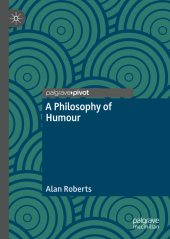 Neuerscheinungen 2019Stand: 2020-02-01 |
Schnellsuche
ISBN/Stichwort/Autor
|
Herderstra▀e 10
10625 Berlin
Tel.: 030 315 714 16
Fax 030 315 714 14
info@buchspektrum.de |

Alan Roberts
A Philosophy of Humour
1st ed. 2019. 2019. ix, 133 S. 210 mm
Verlag/Jahr: SPRINGER, BERLIN; SPRINGER INTERNATIONAL PUBLISHING 2019
ISBN: 3-03-014381-3 (3030143813)
Neue ISBN: 978-3-03-014381-7 (9783030143817)
Preis und Lieferzeit: Bitte klicken
Humour is a funny thing - everyone knows it but no-one knows what it is. This book addresses the question ┤What is humour?┤ by first untangling the definitions of humour, amusement and funniness before then providing a new theory of humour which draws upon recent research in philosophy, psychology, linguistics and neuroscience. The theory is built up without assuming any prior knowledge and illustrated through humorous examples in a way that is both educational and entertaining for anyone curious to know what makes things funny. This makes the book an accessible illumination on joking matters from dinner tables to online platforms to comedy clubs.
Humour is a funny thing - everyone knows it but no-one knows what it is. This book addresses the question ┤What is humour?┤ by first untangling the definitions of humour, amusement and funniness before then providing a new theory of humour which draws upon recent research in philosophy, psychology, linguistics and neuroscience. The theory is built up without assuming any prior knowledge and illustrated through humorous examples which are both entertaining and educational for anyone curious about what makes things funny. The book is then an accessible illumination of joking matters from dinner tables to online platforms to comedy clubs.
1. Introduction 2. Amusement, Funniness and Humour 1. What is Amusement? 2. What is Funniness 3. What is Humour? 4. Chapter Summary 3. Early Theories of Amusement 1. The Essentialist Approach 2. Early Superiority Theories 3. Early Incongruity Theories 4. Early Incongruity Theories 5. Early Play Theories 6. Chapter Summary 4. The Cognitive Component of Amusement 1 Early Incongruity Theory 1.1. Incongruity Necessary 1.2. Incongruity Sufficiency 2. Unsuccessful Refinements 2.1. Expectation Violation 2.2. Norm Violation 2.3. Erroneous Conceptualisation 2.4. Error Detection 3 Bisociation Refinement 3.1. Bisociation Theories 3.2. Theoretical Synthesis 3.3. Critical Assessment 4. Resolution Refinement 4.1. Resolution Theories 4.2. Theoretical Synthesis 4.3. Critical Assessment 5. The Cognitive Component of Amusement 6. Chapter Summary 5. The Affective Component of Amusement 1. Superiority Theories 1.1. Early Superiority Theory 1.2. Modern Superiority Theory 1.3. Key Insight 2. Release Theories 2.1. Early Release Theory 2.2. Modern Release Theory 2.3. Key Insight 3. Play Theories 3.1. Early Play Theory 3.2. Modern Play Theory 3.3. Key Insight 4. The Affective Component of Amusement 5. Chapter Summary 6. A Theory of Amusement 1. Combining the Cognitive and Affective Components of Amusement 1.1. Cognitive Dissonance 1.2. Theory of Amusement 1.3. Critical Assessment 2. Increasing Amusement via Arousal 3. Chapter Summary.
Alan Roberts has taught philosophy at the University of Sussex and University College London in the UK. His research on humour has been published in academic books, philosophy journals and online magazines.


